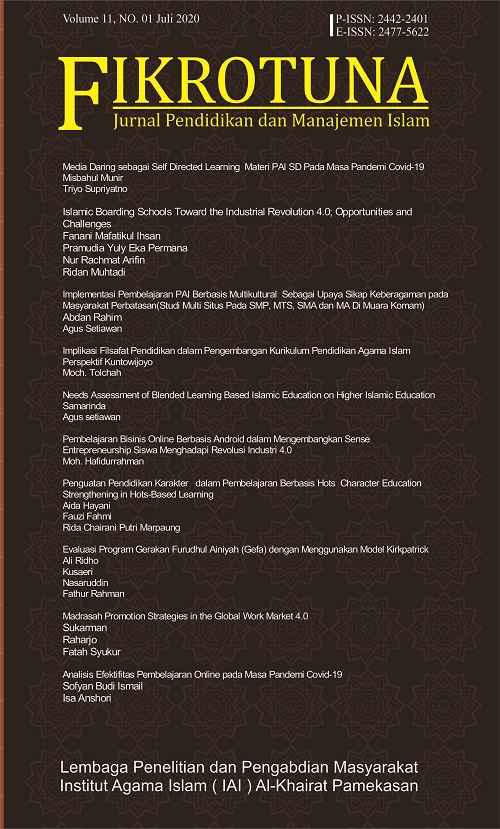Study of Teacher's Digital Technology Ability in Online Classroom Management
DOI:
https://doi.org/10.32806/jf.v12i02.7285Keywords:
Digital Technology; ICT Teacher; ICT competenceAbstract
Teacher TIK competence is the ability of teachers to develop learning by utilizing TIK, such as planning, implementing, and innovating learning. Establishing TIK competence as one of the teacher competencies is a logical consequence of the significant positive influence of TIK on educational activities, especially since the pandemic era. This study aims to determine the awareness and competence of teachers to use digital technology in managing classes in this new average era. This research is fundamental and needs to be done to improve the readiness and mastery of high school teachers in the city of Kendari to use technology and classroom management competencies in the learning process. The method used in this research is a descriptive survey using a quantitative approach. The subjects of this study were 36 sample of teachers at SMA Muhammadiyah Kendari. The results showed that the technology skills of Senior High School teachers were good because the total average score and level of achievement of respondents (LAR) from four indicators of TIK ability (computer/laptop operation, use of computer software, internet, and website usage) had reached 4, 11/82.11%. Although it is in a suitable category, it is still necessary to improve specific skills so that they have a maximum impact on good classroom management and problems solvingReferences
Alida, Nelfi, and Mr. Jamilus. “Pelatihan Daring Sebagai Upaya Peningkatan Kompetensi Guru Di Era Pandemi.†JIRA: Jurnal Inovasi dan Riset Akademik 2, no. 7 (2021): 1096–1106.
Ardoyo, Ardoyo. “Upaya Peningkatan Kompetensi Guru Dalam Menerapkan Pembelajaran Daring Masa Pandemi Covid 19 Di Sd Negeri 3 Sumberargo Sumbermalang Tahun 2020.†Consilium: Education and Counseling Journal 1, no. 2 (2021): 255.
Arman, Pasrun Adam, Jufra, La Ode Saidi, and Irma Yahya. “Peningkatan Kompetensi Guru-Guru SMA / SMK Di Kota Kendari Melalui Pembuatan Media Pembelajaran Web Blog Dan e-Modul Untuk Mendukung Pembelajaran Online.†Jurnal Pengabdian Masyarakat Ilmu Terapan 2, no. 2 (2020): 196–204.
Batubara, Beby Masitho. “The Problems of the World of Education in the Middle of the Covid-19 Pandemic.†Budapest International Research and Critics Institute (BIRCI-Journal): Humanities and Social Sciences 4, no. 1 (2021): 450–457.
Batubara, Delila Sari, Universitas Islam Negeri, Maulana Malik Ibrahim, Sekolah Dasar, and Madrasah Ibtidaiyah. “Kompetensi Teknologi Informasi Dan Komunikasi Guru SD/MI (Potret, Faktor-Faktor, Dan Upaya Meningkatkannya) INFORMASI ARTIKEL†3, no. 1 (2017): 48–65.
Cendana, Nanik Margaret Tarihoran and Wiputra. “Upaya Guru Dalam Adaptasi Manajemen Kelas Untuk Efektivitas Pembelajaran Daring.†Jurnal Persada III, no. 2 (2020): 75–79.
Chow, Eric J., Timothy M. Uyeki, and Helen Y. Chu., "The effects of the COVID-19 pandemic on community respiratory virus activity.", Nature Reviews Microbiology 21.3 (2023): 195-210
Gustriani, Delita, Rinja Efendi, S Pd, and others. “Manajemen Kelas Di Sekolah Dasar†(2021).
Hambatan, Mengkaji, and Pembelajaran Jarak. “Indonesia Di Masa Krisis Pandemi Covid-19.†Ringkasan Kebijakan 19, no. 2 (2020): 1–9.
Jena, Pravat Kumar, “Impact of Pandemic COVID-19 on Education in Indiaâ€, International Journal of Current Research (IJCR), 12, (2020)
Lassoued, Zohra, Mohammed Alhendawi, and Raed Bashitialshaaer. “An Exploratory Study of the Obstacles for Achieving Quality in Distance Learning during the COVID-19 Pandemic.†Education sciences 10, no. 9 (2020): 232.
Mahmood, Samreen. "Instructional strategies for online teaching in COVIDâ€19 pandemic." Human behavior and emerging technologies 3.1 (2021): 199-203
McLeod, Joyce, Jan Fisher, and Ginny Hoover. The Key Elements of Classroom Management: Managing Time and Space, Student Behavior, and Instructional Strategies. ASCD, 2003.
Misnawati, Misnawati, I Nyoman Karma, and Itsna Oktaviyanti. “Analisis Strategi Guru Dalam Pengelolaan Kelas Daring Di Kelas V SDN 35 Ampenan Tahun 2020/2021.†Jurnal Ilmiah Profesi Pendidikan 7, no. 1 (2022): 177–181.
Purnomo, Dwi Tjahjo. “Jurnal Riset Ekonomi Dan Bisnis.†Jurnal Ilmiah 13, no. 1 (2021): 100–110.
Ratten, Vanessa. "The post COVID-19 pandemic era: Changes in teaching and learning methods for management educators." The International Journal of Management Education 21.2 (2023): 100777.
Purwanto, Agus. "COVID-19 pandemic and home online learning system: Does it affect the quality of pharmacy school learning?." Sys Rev Pharm 11.8 (2020): 524-530.
Schleicher, Andreas. “The Impact of COVID-19 on Education: Insights from Education at a Glance 2020.†OECD Journal: Economic Studies (2020): 1–31. https://www.oecd.org/education/the-impact-of-covid-19-on-education-insights-education-at-a-glance-2020.pdf.
Siyoto, Dr Sandu, and M.Ali Sodik. Dasar Metodologi Penelitian. Literasi Media Publishing, 2015.
Sobon, Kosmas, and Manuel E Korompis. “Peluang Peningkatan Kompetensi Guru Di Masa Pademi Virus.†Jurnal Studi Guru Dan Pembelajaran 4, no. 2 (2021): 287–296. https://www.e-journal.my.id/jsgp/article/view/589.
Starkey, Louise. "A review of research exploring teacher preparation for the digital age." Cambridge Journal of Education 50.1 (2020): 37-56.
Tekege, Martinus, Program Studi, Teknik Informatika, Universitas Satya, Wiyata Mandala, and Teknologi Informasi. “Pemanfaatan Teknologi Informasi Dan Komunikasi Dalam Pembelajaran Sma Yppgi Nabire†2, no. 1 (2017): 40–52.
Tondeur, Jo, et al. "Teacher educators as gatekeepers: Preparing the next generation of teachers for technology integration in education." British Journal of Educational Technology 50.3 (2019): 1189-1209.
Downloads
Published
How to Cite
Issue
Section
License
Copyright (c) 2023 Hikmawati Rahayu, Nadhif Muhammad Mumtaz, Siti Khoiriyah

This work is licensed under a Creative Commons Attribution-NonCommercial 4.0 International License.


.png)




